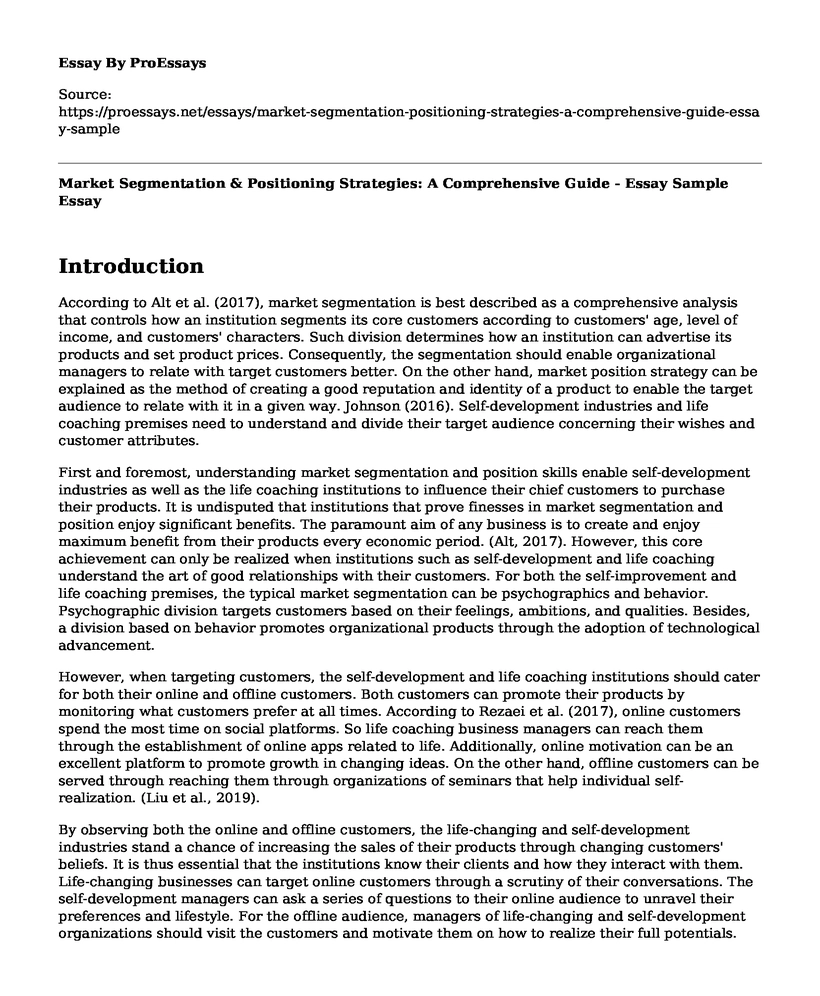Introduction
According to Alt et al. (2017), market segmentation is best described as a comprehensive analysis that controls how an institution segments its core customers according to customers' age, level of income, and customers' characters. Such division determines how an institution can advertise its products and set product prices. Consequently, the segmentation should enable organizational managers to relate with target customers better. On the other hand, market position strategy can be explained as the method of creating a good reputation and identity of a product to enable the target audience to relate with it in a given way. Johnson (2016). Self-development industries and life coaching premises need to understand and divide their target audience concerning their wishes and customer attributes.
First and foremost, understanding market segmentation and position skills enable self-development industries as well as the life coaching institutions to influence their chief customers to purchase their products. It is undisputed that institutions that prove finesses in market segmentation and position enjoy significant benefits. The paramount aim of any business is to create and enjoy maximum benefit from their products every economic period. (Alt, 2017). However, this core achievement can only be realized when institutions such as self-development and life coaching understand the art of good relationships with their customers. For both the self-improvement and life coaching premises, the typical market segmentation can be psychographics and behavior. Psychographic division targets customers based on their feelings, ambitions, and qualities. Besides, a division based on behavior promotes organizational products through the adoption of technological advancement.
However, when targeting customers, the self-development and life coaching institutions should cater for both their online and offline customers. Both customers can promote their products by monitoring what customers prefer at all times. According to Rezaei et al. (2017), online customers spend the most time on social platforms. So life coaching business managers can reach them through the establishment of online apps related to life. Additionally, online motivation can be an excellent platform to promote growth in changing ideas. On the other hand, offline customers can be served through reaching them through organizations of seminars that help individual self-realization. (Liu et al., 2019).
By observing both the online and offline customers, the life-changing and self-development industries stand a chance of increasing the sales of their products through changing customers' beliefs. It is thus essential that the institutions know their clients and how they interact with them. Life-changing businesses can target online customers through a scrutiny of their conversations. The self-development managers can ask a series of questions to their online audience to unravel their preferences and lifestyle. For the offline audience, managers of life-changing and self-development organizations should visit the customers and motivate them on how to realize their full potentials.
Conclusion
Both market segmentation and positioning target at convincing to have a preference for particular brand products. The strategies, however, should target both the online and offline customers to earn the wishes of many customers. Strategies used to win online customers are different from those used to win the offline audience. However, both methods should have a common intention of serving the interests of consumers.
References
Alt, J., and Iversen, T., 2017. Inequality, labor market segmentation, and preferences for redistribution. American Journal of Political Science, 61(1), pp.21-36.
Johnson, G., 2016. Exploring strategy: text and cases. Pearson Education.
Liu, Y., Liu, A., Liu, X. and Huang, X., 2019. A statistical approach to participant selection in location-based social networks for offline event marketing. Information Sciences, 480, pp.90-108.
Rezaei, S., Wee, C.H., and Valarie, N., 2017. Essential of Apps Marketing Implementation and E-Commerce Strategies: Apps Users' Decision-Making Process. In Apps Management and E-Commerce Transactions in Real-Time (pp. 141-158). IGI Global.
Cite this page
Market Segmentation & Positioning Strategies: A Comprehensive Guide - Essay Sample. (2023, Apr 24). Retrieved from https://proessays.net/essays/market-segmentation-positioning-strategies-a-comprehensive-guide-essay-sample
If you are the original author of this essay and no longer wish to have it published on the ProEssays website, please click below to request its removal:
- The Key to Successful Public Relations and Advertisement Cases
- Value Creation and Competitive Advantage Essay Example
- Best Buy: Using Customer Centricity to Connect With Consumers Paper Example
- The Pricing Structure and Strategy in the Concert Industry Paper Example
- Essay Sample on Consumers in Charge: How Consumer Sovereignty Impacts Industry
- Essay Example on Small Biz Utilizes Facebook Ads for Ecommerce & ML Advantages
- Paper Example on Integrating DESC & CR Models for Civility in Organizations







